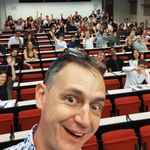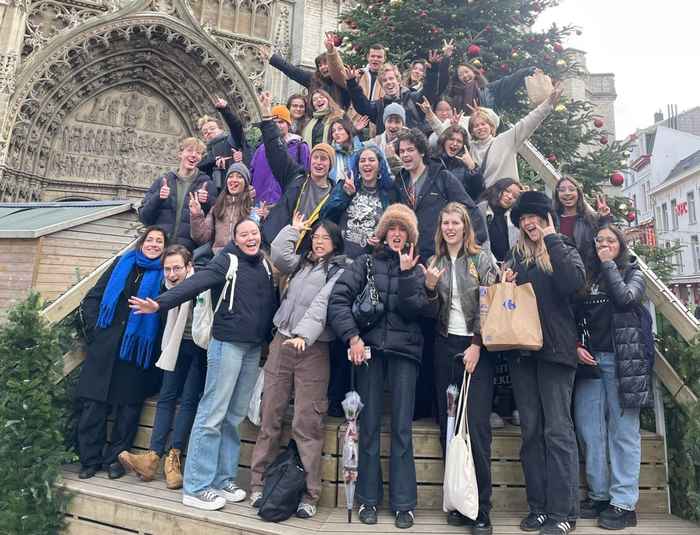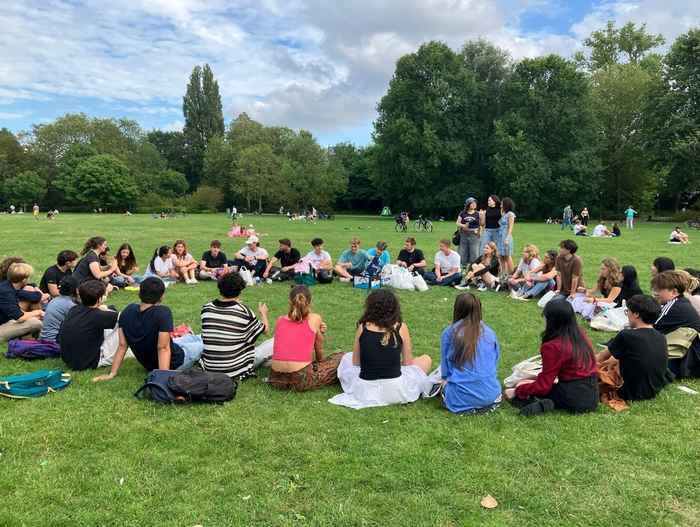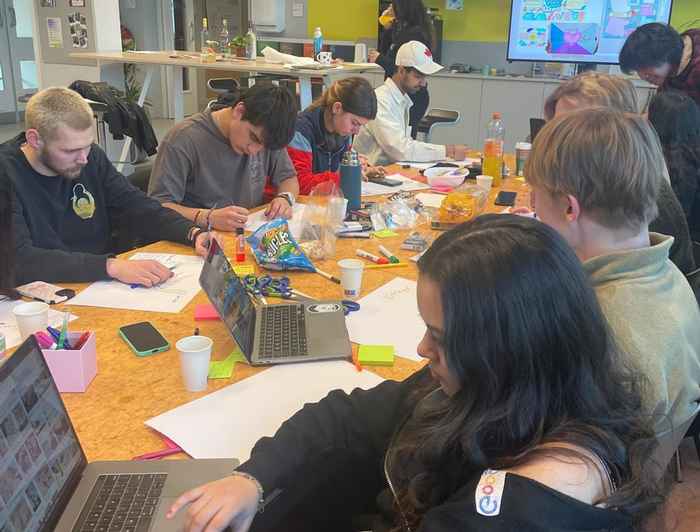Study programme
-
Year 1
In your first year, you'll have two semester-long courses. You'll work in small groups of 4 to 6 students on big projects focusing on climate change and digital surveillance.
This year sets you up to understand society's problems and to see different perspectives. You will also learn research skills and the basics of data science, including programming skills (Python) for beginners.
-
Year 2
In your second year, you'll also undertake semester-long courses, centred on health, mobility, and inequality.
Collaborating on group assignments from external partners, you'll brainstorm about digital interventions to enhance stakeholder interaction, coordination, and communication. Moreover, you'll gain insight into societal inequalities and their impact, including biases within AI.
-
Year 3
In the third year, you can opt for a minor or electives from other programmes, take an internship or study abroad. You will complete your degree with a capstone project in cooperation with a socially engaged organisation. This project serves as an opportunity to showcase your acquired knowledge and skills, making a tangible impact on the world.
-
Foundation: Appreciating the complexity of social challengesPeriod 1Period 2Period 330
Throughout the semester, students tackle climate change and surveillance challenges. Design thinking, literature research, and workshops on collaboration and time management are emphasized. Theoretical exploration delves into societal complexities and stakeholder perspectives. Practical skills are developed through data analysis techniques, Python programming, and data visualization. The semester culminates in project reflection and individual growth assessment.
-
Building blocks: Experimenting with digital interventions of behavioural changePeriod 4Period 5Period 630
Create a digital behavioral change prototype focused on climate change or surveillance. The process involves sensing, visioning, prototyping, and testing cycles, including focus groups and website creation. You learn about project management, stakeholder analysis, collaboration, and persuasive writing.
-
Connections: Linking data for better interventions in health or mobility systemsPeriod 1Period 2Period 330
Engage in exploring (systemic) digital interventions to enhance stakeholder interaction in mobility or health systems. Collaborate in project teams on challenges proposed by external partners. Instead of creating a technology, you'll produce an intervention document for implementation. Consider business, ethics, theory, and methods in the document. Learn data collection and analysis techniques like content analysis and machine learning, study complex processes, and reflect on your group project and personal growth.
-
Structures: Applying responsible AI to reduce inequalityPeriod 4Period 5Period 630
Collaborate in project groups to develop predictive models for real-world challenges using data science. Navigate the entire data science lifecycle, reflecting on decisions and engaging stakeholders. Consider the ethical implications of AI applications and address bias concerns. Create presentations, demos, and reports showcasing responsible AI systems, and reflect on personal growth and project outcomes.
-
Capstone: Making social change with digital innovationsPeriod 4Period 5Period 630
Collaborate in a project team to address a societal challenge proposed by an external partner. Using both social and digital sciences, you will design and implement an innovative solution. You will learn to conduct critical research, collaborate, prototype, and create impact in society.

No coding experience? No worries, you’ll be programming before you know it!Lecturer Steve Pickering shares his thoughts on Computational Social Science
Heat stress challenge
Rethinking crowd control
The 10 eyes mission: seeing better!
Rethinking (fast) food
Biking to the airport

We created a tool for community science: a way for residents to experiment, explore, and shape their own environment.Danielius and his group built an agent-based model
-
Encouraging curious learning
The emphasis in the study is on the learning process in which you are encouraged to be curious, try and discover. Mistakes are allowed. You will always receive feedback before handing in an assignment for assessment. These insights can be applied immediately (feedforward).
There are no exams for individual assignments and a group project. It is not about reproducing knowledge but about integrating and applying knowledge, (research) skills and techniques. Because the focus is primarily on learning and less on final grades, you'll get descriptive grades (Excellent, Good, Satisfactory, Insufficient and Unacceptable).
-
Projects
Each week, there is a scheduled session with a dedicated Core Lecturer for check-in and check-out. In this meeting, goals are established for the upcoming week, feedback is provided, and group collaboration is discussed.
The final products of your group projects can range from policy briefs and manifestos to websites, experimental designs and digital tools. For your individual tasks you might write literature reviews, essays, and research proposals or make information visualisations. Each semester, half your grade comes from group work and individual assignments.
You could work on topics such as:
- Encouraging eco-friendly habits with interface design of electric appliances
- Using big data to address youth aggression in specific areas
- Studying blockchain’s impact on transparency and sustainability in logistics
- Understanding infectious disease spread
- Using information technology to highlight human rights issues
- Exploring digital forensics' role on society
- Tracking social movements in the age of (digital) surveillance
- Empower refugees with technology-based solutions
Students work with a variety of project partners, including both start-ups and large organisations. Here are some examples:
- Gemeente Amsterdam
- Police
- Goodfish
- Dutch Ministry of Health, Welfare and Sports
- Coalition for Sustainable Boating
- Join the Pipe
- Waternet
-
Exchange
The UvA has partnerships and exchange agreements with more than 100 other universities. As part of your Bachelor's programme you can do an exchange semester abroad. This can be a valuable learning and cultural experience, and a great addition to your degree programme.
Note: You can only go abroad in your third year (fifth semester).
-
Internship
You can devote your fifth semester to taking an internship at an organisation of your choice. This internship will provide you with the opportunity to gain relevant work experience and apply your academic knowledge in a professional setting.
Moreover, the internship will enable you to develop and apply practical skills while putting to use the knowledge that you have gained during the programme.
-
Electives
Tailor your programme to suit your preferences. You can acquire 30 elective study credits by taking courses from another Bachelor's programme at the UvA, allowing for an additional specialisation. Alternatively, you can opt for a minor: a comprehensive six-month program taken outside your main program. For instance, you might select a minor in Communication Science or Entrepreneurship.
-
Opportunities to excel: Honours programme
The Computational Social Science programme does not focus on exams and grades, but on final products and learning objectives. Therefore, the grading scheme differs from other programmes at the UvA and does not have a Cum Laude criteria. However, there are plenty of other ways to show your amibition: through the final products of your Capstone Project, extracurricular activities, or the Honours and Talent Programme (HTP).
You’ll take the HTP alongside your regular studies. You will be introduced to scientific research in an original way through a challenging package of in-depth or broadening courses. If you are up to it, then it's an opportunity not to be missed!
-
Want to read the information in Dutch?
Are you a Dutch-speaking student? Then you can also read the information about the Bachelor’s programme in Dutch.
-
Time distribution
Contact hours: On average, you will have 14-18 hours of classes per week
- Large-scale lectures: 4 hours per week
- Small-scale tutorials: 6 hours per week
- Practical sessions/workshops: 8 hours per week
- Self-study and Group work: 22 hours per week
Total study load: 40 hours per week
Study takes place during the week with no deadlines in the evening or on weekends. With your well-being as a student in mind, January and June allow for extra vacation and preparation for the next course.
-
Teaching methods
- Lectures by a Faculty Speaker: the lecturer explains the topic and you will have the opportunity to ask questions
- Workshops: you will practice with the topic in smaller groups, under the guidance of a Core Lecturer. During the weekly check-in and check-out, you will set goals for that week, discuss how collaboration in the group is going, and receive feedback on your assignment, which you can process afterwards.
- Practicals: you will learn practical programming and research skills
-
Tutoring
At the start of the week, you will have a check-in meeting with your tutor in small groups. During these meetings, last week’s progress, this week’s plans and tasks, and your need for support are discussed.
At the end of the week, during the check out, you will present and review the progress your project group made and prepare for the project deadline at the end of the day. This creates a weekly deadline and an opportunity for you to reflect on your activities and participate in peer feedback.
Study Association: Bloom
University life is about more than just lectures. It’s about the people you meet, the ideas you challenge, and the opportunities you create for yourself.
As the official study association of Computational Social Science, Bloom brings students from all years together through a vibrant mix of social events, academic workshops, career fairs, creative clubs, and more. Whether you're into data science, art, policy, or simply meeting new people over a 'borrel', there's a place for you at Bloom.
They are here to support your academic journey and help you grow personally and professionally. Join a committee, start a club, or connect with researchers, professionals, and fellow students.
Let your university years bloom into something unforgettable: bloom-uva.nl



-
What are the differences between Computational Social Science and other programmes?
Academic programmes within the Netherlands such as Data Science and Artificial Intelligence have a much stronger and exclusively technical focus, while programmes such as Information Studies, Business Information Technology and Science, Business & Innovation opt for a more business or management-oriented approach. Computational Social Science focusses on more than that: societal issues and change that can be set in motion with the help of data-driven digital innovations.
Interdisciplinary Social Sciences, Digital Society, Global Arts, Culture and Politics, Psychology, Law and Economics are programmes that have an exclusive focus on social sciences, humanities, economics and/or law without the accompanying digital expertise that Computational Social Science offers.
Other interdisciplinary programmes, such as Future Planet Studies, Science, Technology & Innovation, Beta-Gamma and ATLAS, are directed towards different themes than those of Computational Social Science and, generally speaking, address natural sciences-oriented subjects. A thematically related programme to Computational Social Science is Management, Society and Technology. However, this programme has its origins in and focuses on public administration.
To sum up, Computational Social Science enables students to gain hands-on experience with data science, artificial intelligence techniques and programming skills fully integrated with perspectives from social sciences and humanities on digital innovations in society.
-
Is there a lot of math involved in the programme?
An understanding of mathematical concepts is fundamental to learning statistics and programming. Therefore, various semesters of our programme in Computational Social Science will include some lectures on mathematical topics.
To program, you will need to learn the basics of linear algebra and calculus to be able to understand certain algorithms, as you will learn to design and implement these during your studies. If you have prior knowledge of Wiskunde B (Math B, according to the Dutch educational system), you will have a slight advantage in understanding these concepts. However, the setup of our programme ensures that all students will be supervised to reach the required level in linear algebra and calculus.
For example, it will be easier for you to understand a concept such as gradient descent. Gradient descent is a widely used algorithm in machine learning for finding local minima. It uses the partial derivative of a function but do not worry if this concept means nothing to you right now.
For statistics, statistical concepts and statistical testing are rooted in probability analysis and distributions. If you have prior knowledge of Wiskunde A (Math A, according to the Dutch educational system), you will have a slight advantage in understanding these sorts of concepts.
For example, you might have an easier time with problems relating to normal distributions and statistical testing. To certify that a result of a research project is significant, the probability that the finding is by chance is calculated and compared to a distribution.
Find out what specific entry requirements apply to you by consulting the diploma finder.
-
How will you learn programming and what will you learn exactly?
Our programme consists of a study load of 52 ECTS in teaching and learning within Digital Expertise (DE) and is dedicated to a wide range of computational skills. Within the DE learning trajectory of our curriculum, you are going to learn programming and data wrangling in Python, user experience (UX) design applications and web development in JavaScript, and various modelling and machine learning techniques to interpret data and comprehend complex system structures.
Teaching and learning in DE will be mostly done via practical sessions in which you will actively work on exercises and assignments guided by a Teaching Assistant. You will continuously apply computational skills in your semester projects integrated with the knowledge and skills acquired through the other learning trajectories in out curriculum, such as Research Expertise (RE) and Change Making Expertise (CME).
An important aspect of our programme is, therefore, its focus on application. Once you have graduated, you will be highly competent in applying a proper computational tool, chosen from your elaborate toolset, to tackle real-life societal problems with real-life data.
-
Do you need to have any prior knowledge of programming before starting your first year?
No, you don’t. If you have experience programming, you might have a slight advantage at the beginning. However, our programme team assumes that you have no programming experience. There will be ample supervision and exercises to help you develop a basic level of programming skills to succeed in your studies.
-
How is student performance assessed in this programme?
Since Computational Social Science is solely focused on project-based teaching and learning, 50% of the total assessment in each semester takes place through the semester-long group projects. Small groups of about 4-6 students hand in weekly assignments leading up to a final product at the end of the semester. These weekly assignments can, for instance, be written project proposals and group presentations. The remainder of your final grade each semester (50%) is obtained through individual assessment, such as literature reviews, essays, reflective reports on team collaboration or programming assignments.
-
Do I need to bring my own laptop?
Our programme in Computational Social Science endorses the policy of Bring Your Own Device (BYOD) for teaching and learning. As a student, you will be required to have a laptop of your own to be able to participate in various educational components of the programme.
You may decide on the laptop yourself. However, the programme has set minimum requirements to your device. Please see the list below.- Internal memory (RAM): 4GB or more
- Storage (HDD or SSD): 128GB, SSD is recommended
- WiFi: Multiband (2.4GHz and 5GHz)
- Screen diagonal: minimum 11"
- Screen resolution: 1366x768 or better, 1920x1080 is recommended
- Webcam internal or external for distance learning
- Chromebook, iPad or tablet are not sufficient
- Make sure that a decent WiFi connection is possible
Please note: in principle, all operating systems (Windows, macOS, Linux) can be used, but bear in mind that most students will be using Windows. With other operating systems, more research may be needed. Some courses may use software that only runs on Windows; the programme will provide the necessary software and licenses to run Windows in a virtual machine for this purpose. If you are a Mac user, your laptop must have at least the OSX 10.9 (Mavericks) operating system.
If you have questions or remarks concerning BYOD for Computational Social Science, please do not hesitate to reach out to our Study Adviser (studyadviser-cssci@uva.nl) -
What does the student population look like?
-
The student population of Computational Social Science is a combination of Dutch and international students from all over the world. About 30% of students completed their previous education in the Netherlands and 70% of the students have an international background. Last September, ±100 students started with this Bachelor’s programme.
We aim to offer an international classroom that will provide you with an advantage in both the present and the future. During each lecture and seminar, you will be encircled by a group of students and programme staff of various languages and cultures, personal interests and prior education. Discussions and projects on those societal issues that are labelled ‘wicked problems’ at the core of our programme will thus be enriched by the broad range of perspectives and experiences.
Precisely thanks to the diversity of our student body, the programme strives for a safe learning environment for each and every one of you and our team will do its utmost to make you feel at home within our Computational Social Science community.
-
-
What is the ratio between international and Dutch students?
The student population of Computational Social Science is a combination of Dutch and international students from all over the world. About 30% of students completed their previous education in the Netherlands and 70% of the students have an international background.
We aim to offer an international classroom that will provide you with an advantage in both the present and the future. During each lecture and seminar, you will be encircled by a group of students and programme staff of various languages and cultures, personal interests and prior education. Discussions and projects on those societal issues that are labelled ‘wicked problems’ at the core of our programme will thus be enriched by the broad range of perspectives and experiences.
Precisely thanks to the diversity of our student body, the programme strives for a safe learning environment for each and every one of you and our team will do its utmost to make you feel at home within our Computational Social Science community.